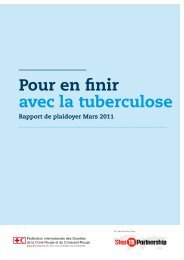Thailand - Stop TB Partnership
Thailand - Stop TB Partnership
Thailand - Stop TB Partnership
You also want an ePaper? Increase the reach of your titles
YUMPU automatically turns print PDFs into web optimized ePapers that Google loves.
Preface<br />
On the first World <strong>TB</strong> Day of the new millennium, ministerial representatives of the 20<br />
countries carrying 80 percent of the global tuberculosis (<strong>TB</strong>) burden adopted the Amsterdam<br />
Declaration to <strong>Stop</strong> <strong>TB</strong>. By adopting the Declaration, these governments pledged to take bold<br />
new steps in addressing the <strong>TB</strong> epidemic in their countries and affirmed their commitment<br />
to “implement, monitor and evaluate” their national <strong>TB</strong> programs according to the <strong>TB</strong> control<br />
strategy recommended by the World Health Organization (WHO).<br />
In the Declaration, the governments also expressed their will to “promot[e] the<br />
development of . . . partnerships to stop tuberculosis with all stakeholders in society, including<br />
government departments and organizations, the private health sector, industry, nongovernmental<br />
organizations and the community” (emphasis added).<br />
Public Health Watch supports independent monitoring of governmental compliance<br />
with the Amsterdam Declaration as part of its mandate to promote informed civil<br />
society engagement in policymaking on tuberculosis and HIV/AIDS—two closely linked diseases<br />
that lead to millions of preventable deaths annually. Established by the Open Society<br />
Institute’s Public Health Program in 2004, Public Health Watch also supports civil society<br />
monitoring of governmental HIV/AIDS and <strong>TB</strong>/HIV policies, examining compliance with<br />
the United Nations Declaration of Commitment on HIV/AIDS and the WHO Interim Policy<br />
on Collaborative <strong>TB</strong>/HIV Activities.<br />
For the <strong>TB</strong> Monitoring Project, Public Health Watch civil society partners in<br />
Bangladesh, Brazil, Nigeria, Tanzania, and <strong>Thailand</strong> have prepared assessments of national<br />
<strong>TB</strong> policies based on a standardized questionnaire, which facilitates structured review of<br />
governmental compliance with key elements of the Amsterdam Declaration and the WHO<br />
<strong>TB</strong> control strategy. Public Health Watch researchers come from a range of backgrounds,<br />
including academia, development, journalism, and independent activism, and from both<br />
large and small nongovernmental organizations (NGOs).<br />
The Public Health Watch monitoring methodology incorporates multiple opportunities<br />
for dialogue and exchange with a range of policy actors during report preparation.<br />
Researchers convene an advisory group of national <strong>TB</strong> experts, activists, and policy actors.<br />
They prepare draft reports on the basis of input from the advisory group, desktop and field<br />
research, interviews, and site visits. Researchers then organize in-country roundtable meetings<br />
to invite feedback and critique from policymakers, academics, government officials,<br />
representatives of affected communities, and other key stakeholders. Finally, Public Health<br />
PUBLIC HEALTH WATCH MONITORING REPORTS 5



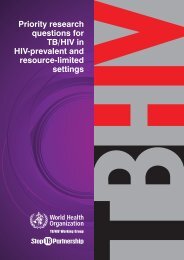
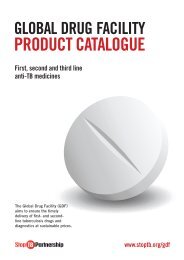
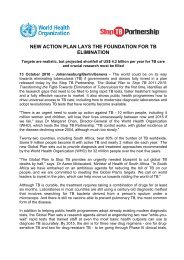
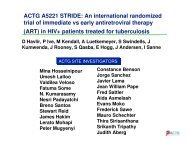
![Global Drug Facility Annual Report 2011 [.pdf] - Stop TB Partnership](https://img.yumpu.com/26788745/1/184x260/global-drug-facility-annual-report-2011-pdf-stop-tb-partnership.jpg?quality=85)

![Concept note on national stop TB partnership [.pdf]](https://img.yumpu.com/26788741/1/184x260/concept-note-on-national-stop-tb-partnership-pdf.jpg?quality=85)

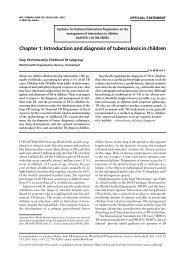
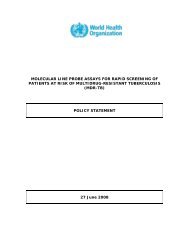
![2005 and Challenges for 2006 - 2015 [.pdf] - Stop TB Partnership](https://img.yumpu.com/26788674/1/190x245/2005-and-challenges-for-2006-2015-pdf-stop-tb-partnership.jpg?quality=85)
![Brochure (French) [.pdf] - Stop TB Partnership](https://img.yumpu.com/17234792/1/190x91/brochure-french-pdf-stop-tb-partnership.jpg?quality=85)

